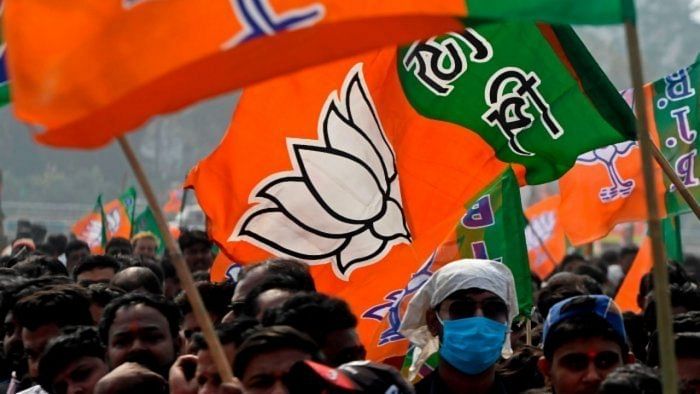
India faced widespread criticism internationally for the denigrating comments by the two BJP leaders, Nupur Sharma and Naveen Jindal, against Prophet Mohammed. But, in the aftermath of the BJP suspending Sharma and expelling Jindal, right-wing groups galvanised significant support for the duo on social media. They also held demonstrations expressing solidarity with the two.
A day after the Friday protests by thousands of Muslims on June 10, demanding arrests of the two BJP leaders, the right-wing Sanatan Seva Sansthan held a demonstration expressing support for Sharma and Jindal in Ahmedabad. The city’s Naari Gaurav Suraksha Samiti also protested rape and death threats against Sharma.
In Bhuj, Karni Sena spokesperson Maulik Sinh said that the BJP might have abandoned her, but “Karni Sena has held her hand”. “I support Nupur Sharma” wings sprouted in Gujarat in the wake of the BJP suspending her.
A candle march was held in Hyderabad’s Hasmathpet locality and posters supporting Sharma in Bihar’s Gopalganj came up overnight. On June 11, over 200 saints, who had gathered in Haridwar for a VHP event, expressed support for Sharma and Jindal.
Leaders like Uma Bharti and BJP MP Pragya Thakur voiced their support for Sharma. Many within the BJP said their party did not treat her fairly. If some expressed unqualified support for Sharma and even Jindal, BJP leaders attributed their change of stand on the issue since the party had already “punished” Sharma, but she was now facing threats.
Political observers say Sharma will soon be a Hindutva icon, and the controversy could only help the BJP, led by Narendra Modi and Amit Shah, consolidate support.
“There is no doubt Sharma is on her way to becoming a Hindutva icon,” political commentator Radhika Ramaseshan says. Within the BJP, Bhopal Lok Sabha MP Sadhvi Pragya Thakur, who defeated Congress heavyweight Digvijaya Singh in the 2019 Lok Sabha polls, is the other upcoming woman Hindutva icon.
However, Ramaseshan believes Sharma, unlike the Sadhvi, has an urban appeal, contributed in some measure by her being an alumnus of Delhi’s Hindu College and the London School of Economics. “She has a more broad-based kind of appeal among a wider audience, the core of which springs from Hindutva,” she says. Sangh Parivar insiders also think the BJP will soon rehabilitate her.
Apoorvanand, who teaches at Delhi University, says it wasn’t the understandable anger of Indian Muslims at Sharma and Jindal’s comments, but international condemnation and the fear of economic repercussions spurred the BJP to ‘punish’ the two and limit the damage.
“Islamophobia has been part and parcel of the BJP’s governing strategy,” Apoorvanand says. He points to Yogi Adityanath’s statement in the run-up to the UP Assembly polls that it was a battle between 80 per cent and 20 per cent. Last year, Assam CM Himanta Biswa Sarma defended the police killing of two Muslims, including a minor, during a forced eviction drive, calling it “an act of revenge” for the past “martyrdom” of the Hindus.
The BJP’s 42-year history, since it was founded in 1980, suggests such controversies helped it consolidate its support base. Every 10 years since the early 1980s, the Sangh Parivar has picked up an issue that has helped it gain greater social and electoral acceptability. In 1981, it agitated against the conversion of hundreds of Dalit families to Islam in Tamil Nadu’s Meenakshipuram. That success spurred it to its next big agitation, the Ram Janmabhoomi movement. In 1992, the kar sevaks razed the Babri Masjid in Ayodhya.
A decade later, 2002 witnessed the communal riots in Gujarat. In 2012, the Sangh Parivar lent its shoulder to the “India Against Corruption” movement, which paved the way for a majority government of its political arm, the BJP, at the Centre. Now, in 2022, with much of its original agenda – Ram temple in Ayodhya and repeal of Article 370 – achieved, it has embraced newer campaigns, such as the transfer of Varanasi’s Gyanvapi Mosque and meting out ‘bulldozer justice’ to those among minorities who dare to protest.
Ramaseshan says the controversy might have hurt the BJP’s and India’s image globally. “But the BJP under Modi and Shah is more focussed on expanding and consolidating its support base, and this will definitely help add to their blueprint,” she says.